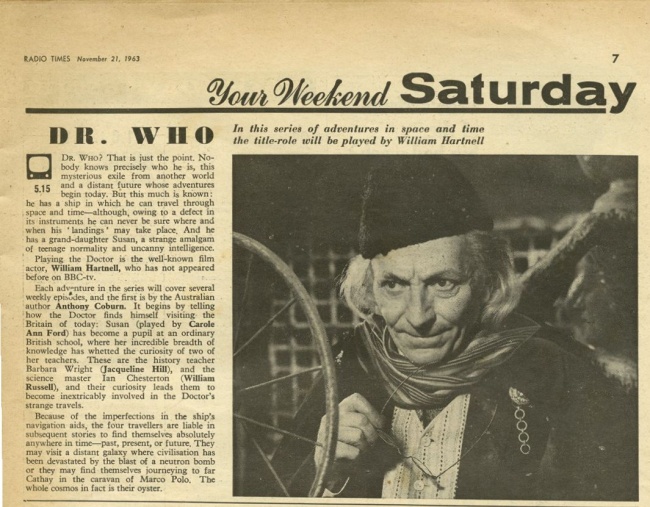Difference between revisions of "Dr. Who? That is just the point"
John Lavalie (talk | contribs) (Created page with "{{article | publication = Radio Times | file = 1963-11-21 Radio Times p7.jpg | px = 650 | height = | width = | date = 1963-11-21 | author = | pages = 7 | language = English...") |
John Lavalie (talk | contribs) |
||
| Line 11: | Line 11: | ||
| type = | | type = | ||
| description = | | description = | ||
| − | | categories = | + | | categories = |
| moreTitles = | | moreTitles = | ||
| morePublications = | | morePublications = | ||
Latest revision as of 23:34, 5 February 2015
- Publication: Radio Times
- Date: 1963-11-21
- Author:
- Page: 7
- Language: English
DR. WHO In this series of adventures in space and time the title-role will be played by William Hartnell
DR. WHO? That is just the point. Nobody, knows precisely who he is, this mysterious exile front another world and a distant future whose adventures begin today. But this much is known: he has a ship in which he can travel through space and time—although, owing to a defect in its instruments he can never be sure where and when his landings' may take place. And he has a grand-daughter Susan, a strange amalgam of teenage normality and uncanny intelligence.
Playing the Doctor is the well-known film actor, William Hartnell, who has not appeared before on BBC-tv.
Each adventure in the series will cover several weekly episodes, and the first is by the Australian author Anthony Coburn. It begins by telling how the Doctor finds himself visiting the Britain of today: Susan (played by Carole Ann Ford) has become a pupil at an ordinary British school, where her incredible breadth of knowledge has whetted the curiosity of two of her teachers. These are the history teacher Barbara Wright (Jacqueline Hill), and the science master Ian Chesterton (William Russell), and their curiosity leads them to become inextricably involved in the Doctor's strange travels.
Because of the imperfections in the ship's navigation aids, the four travellers are liable in subsequent stories to find themselves absolutely anywhere in time—past, present, or future. They may visit a distant galaxy where civilisation has been devastated by the blast of a neutron bomb or they may find themselves journeying to far Cathay in the caravan of Marco Polo. The whole cosmos in fact is their oyster.
Disclaimer: These citations are created on-the-fly using primitive parsing techniques. You should double-check all citations. Send feedback to whovian@cuttingsarchive.org
- APA 6th ed.: (1963-11-21). Dr. Who? That is just the point. Radio Times p. 7.
- MLA 7th ed.: "Dr. Who? That is just the point." Radio Times [add city] 1963-11-21, 7. Print.
- Chicago 15th ed.: "Dr. Who? That is just the point." Radio Times, edition, sec., 1963-11-21
- Turabian: "Dr. Who? That is just the point." Radio Times, 1963-11-21, section, 7 edition.
- Wikipedia (this article): <ref>{{cite news| title=Dr. Who? That is just the point | url=http://cuttingsarchive.org/index.php/Dr._Who%3F_That_is_just_the_point | work=Radio Times | pages=7 | date=1963-11-21 | via=Doctor Who Cuttings Archive | accessdate=23 November 2024 }}</ref>
- Wikipedia (this page): <ref>{{cite web | title=Dr. Who? That is just the point | url=http://cuttingsarchive.org/index.php/Dr._Who%3F_That_is_just_the_point | work=Doctor Who Cuttings Archive | accessdate=23 November 2024}}</ref>
